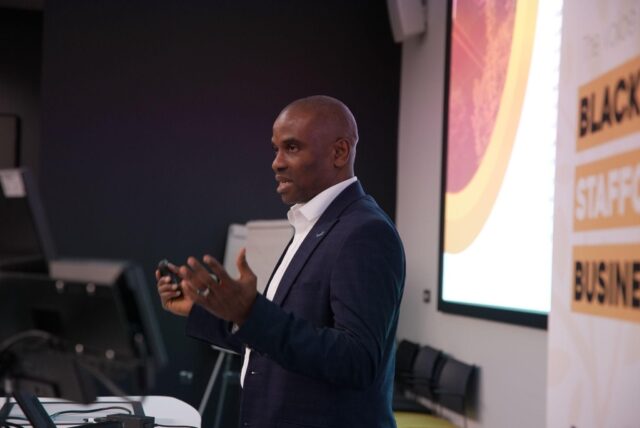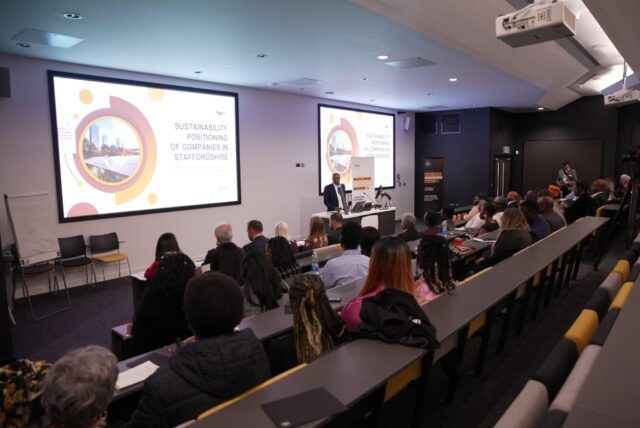The Staffordshire Black Business Network (SBBN) recently hosted a dynamic event centred on empowering black-owned businesses to build resilience and sustainability. Held in collaboration with Keele University and the Staffordshire Chambers of Commerce, this event brought together business leaders, advocates, and policymakers, including the Vice Chancellor of Keele University, Professor Trevor Williams MBE, Chief Executive Officer (CEO) of the Staffordshire Chambers of Commerce, Rachel Laver, and Members of Parliament for Newcastle-under-Lyme, Adams Jogee, Stoke on Trent North, David Williams, Stoke on Trent South, Allison Gardner, and Tamworth, Sarah Edwards.
Many black-owned businesses were present and some had the opportunity to make presentations, including the Founder/Chief Executive of CheckCarbonFact, Oke Epia, who presented findings from our research on the sustainability practices of business in Staffordshire.
The gathering underscored strategies crucial for overcoming today’s environmental and social challenges while fostering sustainable growth.
Presentations generally centred on trust, resilience, collaboration, and sustainable practices, and eventually celebrated the adaptability and vision of black-owned businesses. In a world where systemic barriers persist, these businesses are embracing resilient and sustainable approaches, enhancing their community impact, and building pathways to long-term success.
Diverse Perspectives on Resilience and Community Growth
The event began with a series of presentations highlighting the resilience of black-owned businesses and their contributions to the local economy. The presenters discussed how trust, especially within financial and local institutions, plays a vital role in black-owned businesses’ decisions and growth strategies.
Research from Keele Business School undertaken by Dr. Tolu Olarewaju, who is also the president of the SBBN, emphasised that black entrepreneurs often have greater trust in central institutions than local ones, impacting their access to community-based support.
Agbor Empire, an Afro-Caribbean business, shared practical insights on essential skills needed for operational success, emphasising customer relations and logistics management. A presentation from ASK Equip/We Talk Care underscored how collaboration between businesses provides access to resources, expertise, and larger markets—illustrated through partnerships with global brands. These collaborations often open up alternative funding avenues, such as crowdfunding, which not only provide financial support but also foster a shared sense of achievement within the community.
There was a powerful story from Monica Crull-Hall, deputy president of the SBBN, on hope and homelessness. She narrated how housing instability underscored the need for compassionate policies that support vulnerable communities. Recognition certificates were given to businesses demonstrating innovation, community impact, and resilience, embodying the event’s message of collective growth and positive change.

Oke Epia, Founder/CEO of CheckCarbonFact (second left) in a group photo with MPs and the president of SBBN
Bridging the Gap: Sustainability Challenges and Opportunities for Black-Owned Businesses
Oke Epia presented a pivotal research by CheckCarbonFact that revealed significant gaps in sustainability practices among businesses in Staffordshire. According to the findings, 90% of the sampled businesses lacked visible sustainability or climate change policies on their public platforms. This lack of engagement with sustainability suggests that many local businesses are unprepared for the demands of a climate-conscious economy, where consumers and partners increasingly expect environmental accountability.
Of the 8% of businesses that do maintain a sustainability policy, most do so primarily to comply with regulatory requirements rather than as part of a core business strategy. Only 2% of businesses have embraced sustainability as a fundamental value. CheckCarbonFact’s research emphasised the importance of genuine, proactive sustainability measures that go beyond compliance. These measures serve not only to meet regulatory demands but also to enhance ethical responsibility, improve risk management, and open up growth opportunities.
For black-owned businesses, CheckCarbonFact urged a shift toward adopting climate-resilient practices as part of their growth and operational strategies. Implementing these practices would make businesses more attractive to eco-conscious customers, provide a competitive advantage, and align them with growing Environmental, Social, and Governance (ESG) expectations. Such initiatives would also facilitate entry into sectors that prioritise sustainable and inclusive business practices, strengthening the community’s overall resilience.

Epia, during his presentation at the event
Resilience Beyond Survival: Embracing Sustainability as a Core Principle
The event underscored that resilience for black-owned businesses is not just about overcoming immediate challenges but about establishing a sustainable foundation for future growth. Embracing environmentally friendly practices allows businesses to proactively manage climate-related risks, reduce operational costs, and build a positive reputation in the community. Sustainability is positioned here not as a mere checkbox but as a long-term strategy that drives both resilience and profitability.
By adopting sustainability as a business principle, black-owned businesses stand to benefit from enhanced credibility and stronger relationships with environmentally-conscious consumers. Such practices also provide a foundation for growth in sectors that are increasingly demanding high ESG standards, turning sustainability into a crucial component for a successful, competitive future.
Fostering Transparency and Community Engagement
The importance of transparency in business operations was also highlighted as essential to building community trust and engagement. Black-owned businesses increasingly recognize that clearly communicating their environmental and ethical values to customers is a way to foster loyalty and credibility. Transparency in operations not only builds trust but also positions businesses as community leaders in sustainable practices.
Actively involving the community in sustainability efforts, whether through partnerships, local initiatives, or sharing progress on environmental goals, enhances accountability and strengthens community bonds. This openness allows customers, partners, and stakeholders to share in a vision of sustainable development, aligning community interests with business goals and creating a mutually beneficial relationship.
Innovating for a Sustainable Competitive Edge
The event emphasised how sustainable innovation can give black-owned businesses a unique advantage in a climate-conscious economy. By taking steps such as sourcing eco-friendly materials, minimising waste, and implementing energy-efficient practices, businesses can set themselves apart both environmentally and economically. Each small sustainable action contributes to a larger impact, reinforcing the business’s commitment to responsible practices.
CheckCarbonFact’s research findings were used to illustrate how black-owned businesses can apply sustainable practices like energy efficiency upgrades, waste reduction, and carbon offsetting. These strategies not only mitigate environmental impact but also appeal to eco-conscious consumers who prioritise responsible business practices. With a strong foundation in sustainability, black-owned businesses can carve out a competitive niche while supporting environmental stewardship.

A cross-section of the audience listening to the presentation of CheckCarbonFact’s research with rapt attention
Investing in Long-Term Impact for Lasting Change
The importance of committing to long-term sustainability was another critical takeaway from CheckCarbonFact’s research. With 90% of businesses in Staffordshire lacking a sustainability policy, the need for immediate action among black-owned businesses is clear. Embracing long-term sustainable practices goes beyond regulatory compliance—it empowers businesses to manage risks, attract new partnerships, and build resilience.
The event concluded with a call to action for policymakers and community stakeholders to support black-owned businesses in adopting these sustainable practices. Initiatives such as grants, incentives, and training programmes were suggested as valuable resources to help these businesses make the transition. By laying a foundation focused on sustainable impact, black-owned businesses can contribute to a healthier, more inclusive Staffordshire and secure their place in a climate-conscious future.
Paving the Way for Sustainable Success
The SBBN resilience and recognition event reinforced that the future of black-owned businesses in Staffordshire relies on their ability to embrace sustainable practices, cultivate community trust, and form strategic alliances. Through these principles, black-owned businesses are prepared to drive growth, create resilience, and foster a sustainable future.
By integrating these insights and strategies, Staffordshire’s black-owned business community can build pathways toward long-term success, enhancing resilience and contributing to a sustainable economic landscape that benefits all.



